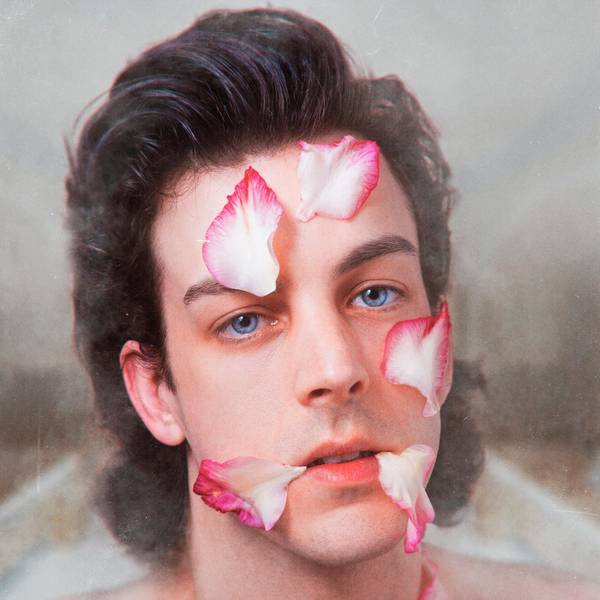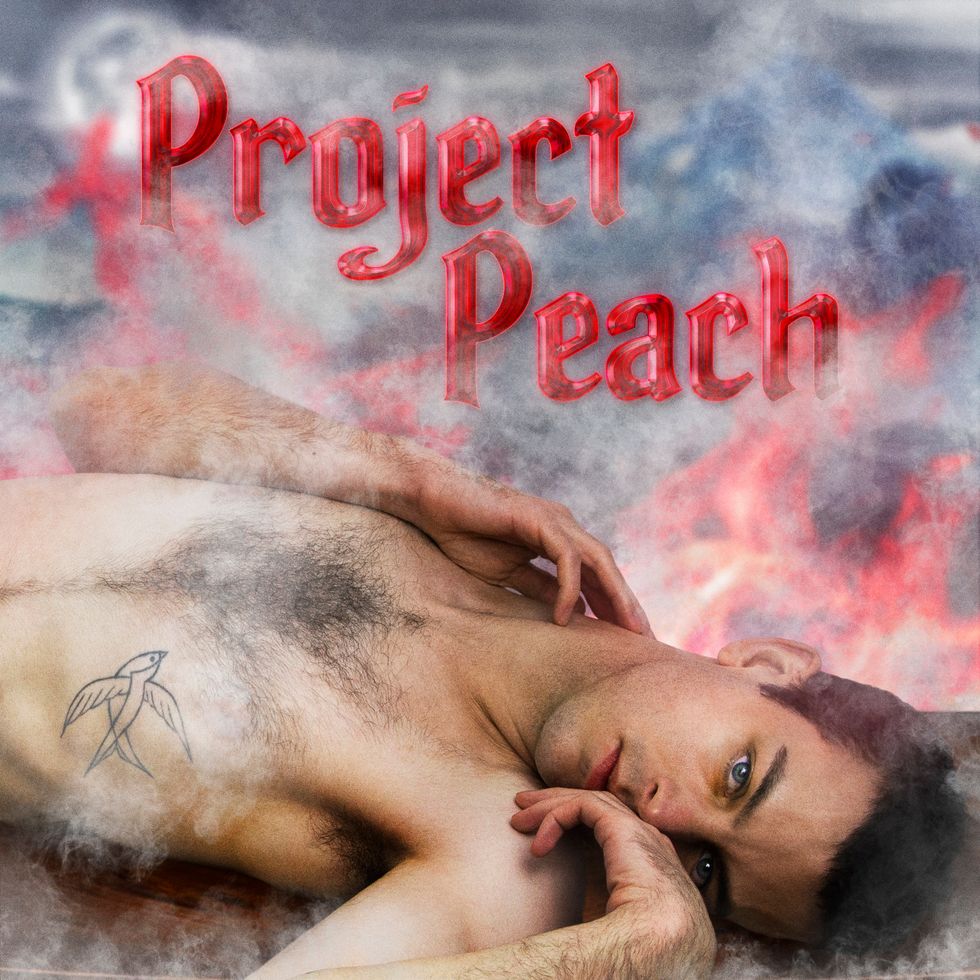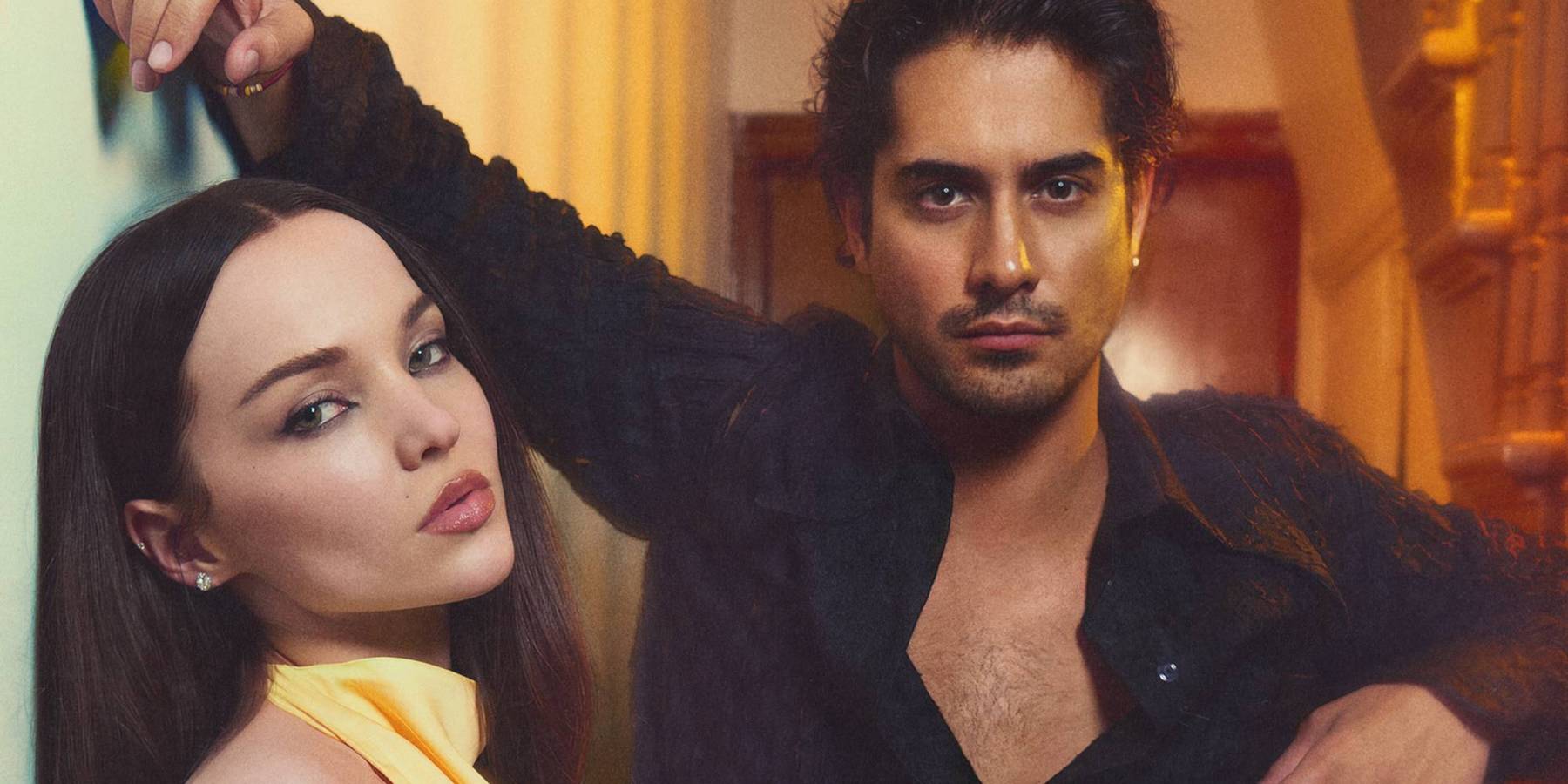
Take a Bite of Sakima's 'Project Peach'
By Matt Moen
Aug 16, 2019British pop singer/producer Sakima wears his heart on his sleeve, which comes through loud and clear in his work, whether it be about grappling with the pitfalls of dating app culture or lopsided power dynamics in sexual encounters. Sakima has never made any attempt to hide the fact that he's gay or the fact that there's a whole host of unspoken problems that come along with that. His openness and willingness to be candid is also something that also comes across as we connect over the phone the week before the launch of his new mixtape, Project Peach.
Our conversation drifts from nerding out over queer history to lamenting the lack of LGBTQ representation in mainstream media growing up, before moving on to the phenomenon of millennial loneliness and finally commiserating about being single. Sakima is careful to fully work through each thought, considering it from multiple angles and relating it back to his own experience, only pausing at one point to get rid of a large spider that had crawled in front of him. He's charming and readily vulnerable; I find myself at the same time opening up to him in ways that I wouldn't normally offer a stranger I wasn't face to face with.
Everything flows so naturally out of Sakima as if he has been talking about these topics all his life, which he has. For Sakima, being labeled a "queer pop artist" is less of a cross he's forced to bear and more so a mission statement — an embodiment of the change he wants to see in the industry. This mixtape, Project Peach, has been a long time coming for the artist. The culmination of two EPs and a slew of singles have helped to push the pop needle towards a queerer place. Not quite the album he had initially teased in interviews, this mixtape was finally a place for Sakima to tie together all of these loose threads across his work into seven songs.
Breaking down Project Peach to its core elements, you find all the right building blocks for a Top 40 song: catchy hooks, glossy instrumentals, lyrics that walk the line between personal and universal. Where it obviously diverges is that it is told through an LGBTQ lens without hesitation; whether or not that proves to be a stumbling block says more about the listener than it does Sakima.

How did Project Peach come together?
I wrote and produced all of it. I had a couple of my writing friends, The Six, which is a UK writing collective responsible for many big hits, help with a couple. But I think it's good when you're the only one because I write and produce and I'll be singing, all that shit. It can be a great strength to have total control. I've never had anyone in my team really tell me what to do, artistically. They will go with whatever my vision is in the moment. That has been amazing, but equally, really debilitating. You get stuck in your own head, you become a bit of a cage sometimes. Project Peach definitely weighed me the fuck down, so I chilled the fuck out for one sec. It was cool because to orchestrate it and bring the vision together and not have to sacrifice anything and not make any consequence.What's the significance behind the title for the mixtape?
I knew it would be called Project Peach a year and a half ago. I think I even made the artwork a year and a half ago, as well. It was around the time when like Call Me By Your Name, launched "peach" into the mainstream vernacular as slang for ass. I'm a bit of a nerd and I like to nerd out on history a lot. I was reading this article that was "50 Queer Facts from History," and there was one that was talking about this ancient Chinese story. There was this part of it where they refer to being gay as like taking a bite of the forbidden peach. It was hyper poetic and a weirdly beautiful way to describe queer people. Putting the word "Project" before it and making it Project Peach was this nice succinct way of saying, "This is what it's about. It's about history and queer stories and queer life and how they've been separate from music, and what stories I think are missing from music, and how can I address the void of queer stories that I've had since growing up.""Some days I feel really queer, some days I feel like a boy or a girl, some days I feel heteronormative, some days I feel sex-crazed, some days I never want to have sex ever again."
Is queer history something you frequently read up on?
I try to, the thing is [Laughs] reading is very hard for me and retaining information is hard. But I try anyway. I do a lot of reading, I do a lot of watching, a lot of listening. A couple of years ago I did a Master's degree in music and that was a great moment where I just really deep dived into queer music and queer history. That is where I started to be like, "Okay, I'm actively going to try and seek this out." With queer history, it's not inherited, we're not born into a community that automatically shares our heritage with us; we have to go out and find it. That's the grit of why we do and don't have certain rights. I think when it's that relevant to you, it's easier to be interested in it. I understand it's not entirely accessible, not everybody wants to go out and find queer literature and all that kind of stuff. It's not like you'll find something. That's why I made the point of putting some of it into my music.Related | Lil Nas X on a Unicorn Floatie
What were those queer stories that you had growing up or coming into terms with your sexuality that really resonated for you?
The people who helped me define who I wanted to be as an artist from when I was a kid to a teenager were people like Antony and the Johnsons, Patrick Wolf, and Rufus Wainwright. Those are definitely the core three. I think music is an interesting thing, because it's hard to find mainstream queer music; a lot flies under the radar, there are a lot on the left field. Which is amazing, but there's a lot more people who don't identify as straight or heteronormative, who don't necessarily like music that is underground. Queer music should not just be about being forward-thinking, it's also about it being fun and accessible. You shouldn't have to dig into the dark web to find queer music. I think now we're in an age where queer music is becoming more pop-focused. That's where real progress is made; it's where queer narrative can become a significant part of a mainstream narrative, regardless of being what you identify as.
Exactly, look at Lil Nas X, he just made history. A Black gay man now holds the record for longest single at number 1. That's incredible if you think about it.
That's so crazy. I obviously love Lil Nas, and I think that song "Panini" is one of the greatest songs at the moment. He's a fucking genius. It's interesting because he hinted at his sexuality throughout his music, even before he blew up, but he didn't fully publicly be like "this is who I am" until after that song was number one. I wonder if it would have been a different story if he'd always been out, like visibly out. I'm crazy to think about all this kind of shit, but I always do, it's so hard not to. It's always something that's on my mind.
Do you ever feel like you're pigeon-holed as a "queer artist," rather than just a pop artist?
I went back and forth between being a bit sick of everything and wanting to be what I want as an artist. You can just like my music if you just like the music. I have a lot of fans that really like the music the way it sounds and don't necessarily listen to the story. As a queer artist, I do think I squeeze between, "I'm more than just a sex-crazed person," which I'm really not and being like, "Fuck it, it's such a big part of who I am." So much of the struggle that I had in my life growing up and within the music industry and also trying to be an artist, so much of the hardship of just being around, being queer, and being a part of that. Some days I feel really queer, some days I feel like a boy or a girl, some days I feel heteronormative, some days I feel sex-crazed, some days I never want to have sex ever again. I don't mind having a reputation of having my songs being hyper-sexual, as long as people are prepared for me to not always be that.Tell me about "Sweet Nothing," which is one of the Project Peach highlights.
I was thinking about modern dating because I'm single and I've been single for fucking ever. I like to think that I choose to be single. There are times when I obviously wish I wasn't; sometimes I really wish I had someone to just hold me at night, sometimes I really want someone to fuck me at night, sometimes I'm really fucking grateful that I don't have to share a bed. I know that this is totally universal, but I have these moments where I redownload Tinder or Grindr and have a weird obsession week on it where it's just me casting the net, saying yes to everyone. And then I get really freaked out by the process of it, feeling really pissed off that life can't bring someone to me. Then I settle on deleting it straight away. It's this DM vortex where you can't stop talking to people, but it's never anything more than that.
You can get pretty close to people, you can feel like having a bit of a connection with someone even if you're just chatting on an app. You're chatting about each other's day, each other's lives, before you actually propose you want another date or not. You form this weird few days of connection with them, but 99% of the time it never really progresses into a date or anything IRL. It's all got me thinking about, "Is that what people want? Am I missing something? Is there going to be a tipping point?" Have we already passed that tipping point where people prefer to keep their love interest online, and sex is something that we become less interested in?" It's more about who's going to like you; who's going to like your picture, who can you have a chat with the longest and all that kind of shit.
"The motivation of my music has always been to express the hidden stories that are all around us but never discussed."
It's an endless cycle.
"Sweet Nothing" explores what would it feel like if I only wanted that. If I wasn't looking for anything real, this digital romance which people might one day prefer. People might prefer having a relationship with a screen, rather than having a relationship with a real person. One of my ex-boyfriends was a bit of an alcoholic and a bit of a druggy, and it all was a horrible time and life was all quite dark. It built this social anxiety in me where now I find being in a bar really hard to get through because it just brings back feelings. I think that's something connected to this social anxiety I have, where it's a lot more comfortable to just be at home in your own safe space, but with a connection to the outside world through your phone. So this song is about the sweetest thing that doesn't exist, that's why it's called "Sweet Nothing."
There is something to be said about putting yourself out there, but from the comfort of your own bed.
When it's too uncomfortable, you just turn it off. I hate the feeling of not being able to make everything stop, when my anxiety starts spinning out. Whereas if I'm on my phone at home, there's this element of fun you can have online, that's way safer for me. I think there's something about the connection between drinking culture and dating culture. Especially in the UK, the drinking culture is fucking massive, it's like the core of almost everyone's lives and I like the juxtaposition between that and online culture. They don't really sit that well together. They don't really connect. It gets to a certain point where you have to pick one. Are you going to hide or are you going to be seen?
Do you feel like that sentiment permeates its way into the rest of the mixtape?
There is another song in this mixtape called "God Fearing Men." It's about how religion can affect people who are queer and the experiences they had that oppressed them. I have friends that have grown up in environments where it's not okay to be gay. Even though they are not in those environments anymore, as adults they made a prison within themselves, based on their upbringing or childhood or their past experiences.
There was this guy I was going out with who was really afraid of something. It was kind of a crisis of identity; this was all very new for him, romantically being with a guy. My brain turns it into this thing where they have the "fear of God." This thing that someone is watching them; they have to make sure they're making the right decision, and they have to make sure that they know themselves. "God" is a really great by-word for the indescribable anxiety that we feel about our identities. This song is about me trying to tell someone that they don't have to be afraid, everything is cool, I just really love them, they really love me, and it's not a bad thing.
What do you hope people take away from the project?
The motivation of my music has always been to express the hidden stories that are all around us but never discussed. If people can feel like someone is finally telling their story, they feel recognized, they feel visible because of something I've written, that's the biggest reward.
What can we expect to see from Sakima going forward?
I have started to really think about what comes after this. I've been saying that Project Peach is like a swan song project. It's sort of like a closing chapter, a better metaphor, of who I've been up to now. My creed isn't ever gonna really change, my rationale for doing music is never really going to change in terms of queer stories and perspectives. I definitely have settled on a concept for a project that I'm just starting to work on now that I've subtly been hinting at on Instagram and in some of the songs that are on Project Peach. But Project Peach is the final chapter of basically who I've been over the past... forever as Sakima. This is me taking the last step as Sakima in this current form.
Photo courtesy of Sakima
MORE ON PAPER
Entertainment
Dove Cameron and Avan Jogia Broke Their Molds
Photography by Gustavo Chams / Story by Joan Summers
Photography by Gustavo Chams / Story by Joan Summers
18 February
ATF Story
Madison Beer, Her Way
Photography by Davis Bates / Story by Alaska Riley
Photography by Davis Bates / Story by Alaska Riley
16 January
Entertainment
Cynthia Erivo in Full Bloom
Photography by David LaChapelle / Story by Joan Summers / Styling by Jason Bolden / Makeup by Joanna Simkim / Nails by Shea Osei
Photography by David LaChapelle / Story by Joan Summers / Styling by Jason Bolden / Makeup by Joanna Simkim / Nails by Shea Osei
01 December
Entertainment
Rami Malek Is Certifiably Unserious
Story by Joan Summers / Photography by Adam Powell
Story by Joan Summers / Photography by Adam Powell
14 November
Music
Janelle Monáe, HalloQueen
Story by Ivan Guzman / Photography by Pol Kurucz/ Styling by Alexandra Mandelkorn/ Hair by Nikki Nelms/ Makeup by Sasha Glasser/ Nails by Juan Alvear/ Set design by Krystall Schott
Story by Ivan Guzman / Photography by Pol Kurucz/ Styling by Alexandra Mandelkorn/ Hair by Nikki Nelms/ Makeup by Sasha Glasser/ Nails by Juan Alvear/ Set design by Krystall Schott
27 October




